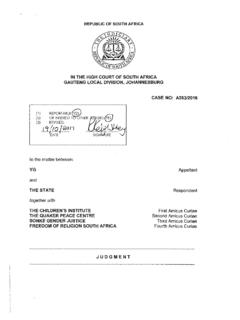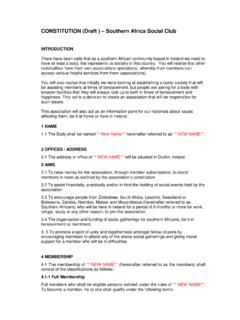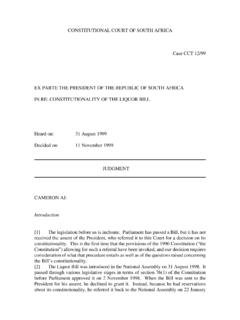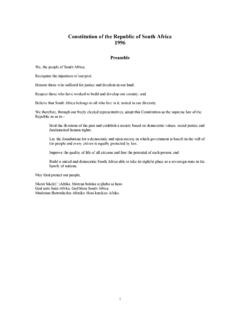Transcription of IN THE CONSTITUTIONAL COURT OF SOUTH AFRICA
1 IN THE CONSTITUTIONAL COURT OF SOUTH AFRICA . CASE NO CCT/25/94. In the matter between: MHLUNGU AND FOUR OTHERS Applicants and THE STATE Respondents HEARD ON : 23 February 1995. DELIVERED ON : 8 June 1995. JUDGMENT. [1] MAHOMED J: I have had the privilege of reading the judgment of Kentridge AJ in this matter and the comments made thereon by some of my esteemed colleagues. I respectfully agree that - (a) section 102 of the Constitution of the Republic of SOUTH AFRICA , 1993 ( the Constitution ) did not entitle the COURT a quo to refer to this COURT the issue of the proper interpretation of section 241(8) of the Constitution;. (b) for the reasons given by Kentridge AJ the proper interpretation of section 241(8) is relevant in the present proceedings and should be determined by this COURT .
2 [2] I have, however, considerable difficulty with the proper interpretation of section 241(8) which reads as follows: "All proceedings which immediately before the commencement of this Constitution were pending before any COURT of law, including any tribunal or reviewing authority established by or under law, exercising jurisdiction in accordance with the law then in force, shall be dealt with as if this Constitution had not been passed: Provided that if an appeal in such proceedings is noted or review proceedings with regard thereto are instituted after such commencement MAHOMED J. such proceedings shall be brought before the COURT having jurisdiction under this Constitution".
3 The attraction of the analysis of section 241(8) which Kentridge AJ has made, is that it is consistent with the literal words of the main part of the sub-section which could, on that approach, simply be reduced to read as follows: "All proceedings which immediately before the commencement of this Constitution were pending .. shall be dealt with as if this Constitution had not been passed.". [3] This literal interpretation involves, however, a number of formidable difficulties. [4] In the first place it leads to some very unjust, perhaps even absurd, consequences. Thus, merely because an accused person was served with an indictment before 27 April 1994, (and even if no evidence whatever was lead before that date) he could not contend that the provisions of section 217(1)(b)(ii) of the Criminal Code were unconstitutional.
4 In the result, the COURT could be compelled to convict him (and in consequence thereof even to imprison him for a substantial period) in circumstances where it has a reasonable doubt whether his confession was freely and voluntarily made and therefore even if the COURT has a reasonable doubt about his guilt. Another accused charged as his co-conspirator could be acquitted simply because the indictment was served on him on 28 April 1994 in respect of an offence arising from exactly the same incident and the same evidence. [5] The right of each of these accused to a "fair trial" in terms of section 25(3) of the Constitution (including the right to counsel in terms of section 25(3)(e)) could similarly be different because of the one day difference in the date of the service of the indictment, although both accused were equally indigent and equally in need of counsel in order to avoid "substantial injustice".
5 The result again may well be a conviction and resultant imprisonment for one accused and the total acquittal of the other, based purely on arbitrary circumstances, totally unjustified by any objective considerations. [6] A Judge passing sentence on the accused charged with committing exactly the same offence, on the same date and in exactly the same circumstances, would be entitled to sentence one accused to death, and may be disentitled to do so in respect of the other accused in the same trial, merely because when the indictment was sought to be served on 26 April 1994, the one accused was at home and the other could not be located until the next morning. 2. MAHOMED J.
6 Exactly the same irrational discrimination would be present if corporal punishment was sought to be imposed. Such a sentence would be competent in respect of the one accused and might be incompetent in respect of the other, on the sole ground that the one indictment was served on the day before and the other on the day after the commencement of the Constitution. [7] SOUTH African statutory law, prior to the enactment of the Constitution, is replete with the most disgraceful and offensive legislation which discriminates against SOUTH Africans of colour and criminalizes arbitrarily and purely on the grounds of race and colour, perfectly innocuous acts of life and living by such citizens.
7 It is possible that a citizen charged with such an offence before the commencement of the Constitution could, on the literal interpretation, be convicted and sentenced, even after 27 April 1994, for having contravened a law, which sought to punish him on racial grounds, if his case was pending when the Constitution came into operation. This is a plainly outrageous consequence. It is suggested by Kentridge AJ that the legislature and the executive can avoid such a consequence by taking steps to repeal the law or to cause the prosecution to be withdrawn. This is of scant comfort to the accused person concerned, who might have no means to compel such a decision or who might be exposed to the risk of a conviction before the bureaucratic machinery of the State reacts to afford relief.
8 He is entitled to say: "The Constitution affords every person equal protection against unfair racial discrimination. I claim that right for myself and my family. You, the COURT must protect me". [8] What these and many other examples would suggest is that the approach favoured by Kentridge AJ would remove the protection of fundamental rights to substantial groups of people in the country, simply because the proceedings in which the protection of such rights might be crucial for a person, had begun prior to the commencement of the Constitution on 27 April 1994, although the substance of the proceedings takes place only after that date. I would be extremely distressed to accept that this is what the Constitution intended.
9 It seems to negate the very spirit and tenor of the Constitution and its widely acclaimed and celebrated objectives. Fundamental to that spirit and tenor was the promise of the equal protection of the laws to all the people of this country and a ringing and decisive break with a past which perpetuated inequality and irrational discrimination and arbitrary governmental and executive action. The literal interpretation would invade all these objectives in its arbitrary selection of one category of persons who would become entitled to enjoy the human rights guarantees of the Constitution and the arbitrary exclusion of another group of 3. MAHOMED J. persons from such entitlement.
10 The Courts must strive to avoid such a result if the language and context of the relevant provision, interpreted with regard to the objectives of the Constitution, permits such a course. What must be avoided, if this is a constitutionally permissible course, is a result which permits human rights guaranteed by the Constitution to be enjoyed by some people and denied arbitrarily to others. Such a consequence would effectively allow substantive parts of a disgraced and unacceptable culture from the past to continue into a future, protected by the Constitution. In proceedings which might affect their lives and liberties, large numbers of SOUTH African citizens would, on purely fortuitous grounds, be unable to assert the expanding human rights guaranteed by Chapter 3 of the Constitution, including the fundamental right to a fair trial protected by section 25(3).















